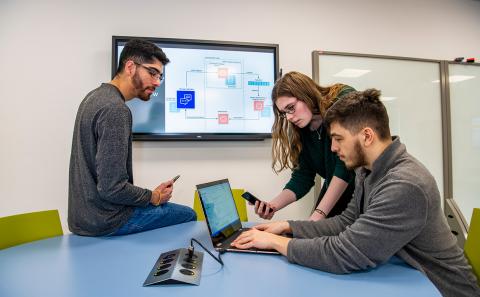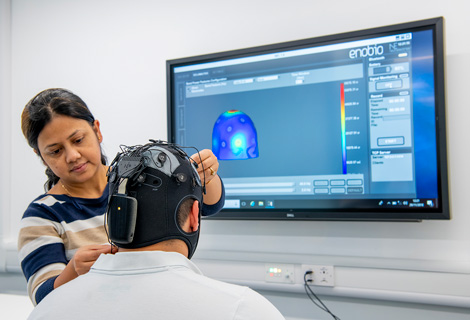PhD MSc PGCE(PCET) BCompSc
Publications
Thuermer, Gefion, Morgan, Cat and Wilde, Adriana G (2018) Mentoring web science MSc students. In Proceedings of the 10th ACM Conference on Web Science. ACM Press..
Wilde, Adriana and Rastic-Dulborough, Olja (2017) Encouraging gender diversity in computing by supporting women's participation in conferences. ACM WomENcourage : Celebration of Women in Computing, Universitat Politecnica de Catalunya, Barcelona, Spain. 06 - 08 Sep 2017. 1 pp .
Zurbuchen, Nicolas, Bruegger, Pascal and Wilde, Adriana (2020) A comparison of machine learning algorithms for fall detection using wearable sensors. In 2020 International Conference on Artificial Intelligence in Information and Communication, ICAIIC 2020. Institute of Electrical and Electronics Engineers Inc. pp. 427-431 . (doi:10.1109/ICAIIC48513.2020.9065205).
Wilde, Adriana, Zaluska, Ed and Millard, David (2015) Student success on face-to-face instruction and MOOCs: what can learning analytics uncover? In Web Science Education Workshop.
Len-Urrutia, Manuel and Wilde, Adriana (2017) Development of a MOOC dashboard. 11th UK Learning Analytics Network meeting, Aston University, Birmingham, United Kingdom. 05 Sep 2017.
Wilde, Adriana (2017) Sentiment analysis of comments in a FutureLearn MOOC. FutureLearn Academic Network (FLAN) Meeting, , London, United Kingdom. 01 Nov 2017.
Wilde, Adriana (2019) Rising to challenges in assessment and feedback in HCI education: A-peer-supported approach. WAIS Research Seminar, , Julian, United States. 17 Oct 2019.
Wilde, Adriana (2018) The role of near-peers in MSc projects. Reimagining the Student Research Project: A workshop at the Computational Foundry, Swansea University, Swansea University, Swansea, United Kingdom. 14 Nov 2018.
Busch, Paulina, Kocsis, Eszter and Wilde, Adriana (2018) Impact of design decisions in information visualization: Two takes on the UNESCO World Heritage Sites dataset. In WomENcourage 2018. ACM Press..
Wilde, Adriana (2018) Clustering of learners' behaviour in the Understanding Language MOOC. FutureLearn Academic Network (FLAN) Meeting, , Glasgow, United Kingdom. 07 Sep 2018.
Bruegger, Pascal, Wilde, Adriana and Guibert, Loic (2020) On the development of a resident monitoring system: Usability, privacy and security aspects. In Proceedings - IEEE Congress on Cybermatics: 2020 IEEE International Conferences on Internet of Things, iThings 2020, IEEE Green Computing and Communications, GreenCom 2020, IEEE Cyber, Physical and Social Computing, CPSCom 2020 and IEEE Smart Data, SmartD. Institute of Electrical and Electronics Engineers Inc. pp. 288-293 . (doi:10.1109/iThings-GreenCom-CPSCom-SmartData-Cybermatics50389.2020.00062).
Oliver, Richard, Wilde, Adriana and Zaluska, Ed (2014) Reprogramming embedded systems at run-time. International Journal on Smart Sensing and Intelligent Systems, 7 (5). (doi:10.21307/IJSSIS-2019-078).
Pirzada, Pireh, Wilde, Adriana, Doherty, Gayle Helane and Harris-Birtill, David (2021) Ethics and acceptance of smart homes for older adults. Informatics for Health and Social Care. (doi:10.1080/17538157.2021.1923500).
Contact
Telephone: +44 (0) 23 8059 7857771826
Email: dianitzdr@gmail.com
MSc, PhD
Postdoctoral Reseach Fellow
Research
Research interests
Microfludics, Lab-on-a-chip, Droplet microfluidics

Investing in Computer Science and Artificial Intelligence
The University of Southampton is investing millions of pounds in Computer Science and Artificial Intelligence, read the full statement here

Multi-million pound investment to keep Southampton at the forefront of Computer Science and Artificial Intelligence
The University of Southampton is investing millions of pounds in Computer Science and Artificial Intelligence (AI) to retain and enhance its international reputation for teaching and research.